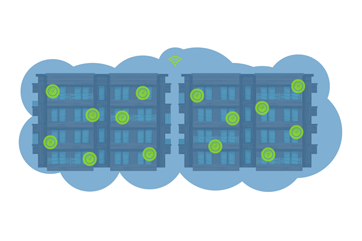What is True Managed WiFi?


Understanding True Managed WiFi Services
High-speed internet is no longer a luxury - it's a necessity. Often referred to as the “fourth utility,” internet access has become the most important service in multi-tenant properties, especially for students and other residents. But when it comes to choosing the right service, things can get confusing. Various providers use terms like WiFi Ready, Advanced WiFi, and Bulk Cable Modem to make their offerings sound more appealing, but not all are truly managed WiFi solutions. So, what is managed WiFi, and why is it the best choice for property owners?
As technology advances and society becomes increasingly reliant on instant access, the demand for fast, reliable internet has skyrocketed. For property managers, WiFi has surpassed even basic utilities like water as the top amenity residents expect. However, delivering high-speed, quality internet to hundreds of units with varying needs can be a challenge. If residents don’t get the performance they expect, they’ll quickly look for alternative housing options. This pressure has led property owners to seek solutions that can meet these demands, and fully managed WiFi services have emerged as the best option. Managed WiFi shifts the responsibility of internet support from property managers to dedicated experts, ensuring reliable, high-quality connectivity for every resident.
Managed WiFi Meaning: A Professional Definition
Managed WiFi, also known as WiFi as a Service (WaaS), is a comprehensive solution that provides end-to-end WiFi connectivity and management. It eliminates the hassle of installing, configuring, and maintaining a WiFi network, making it an attractive option for MDUs, businesses, educational institutions, and hospitality venues.
Benefits of Managed WiFi Services
Managed WiFi offers wireless Internet access for employees, tenants, and guests throughout a property. The services that typically come with managed WiFi include providing your bandwidth or fiber line, resident support, network controllers, switches, cabling, and more.
Essentially, managed WiFi provides internet throughout an entire building, filling the needs of hundreds of customers. These services are 100% the responsibility of your managed WiFi provider and not your staff. The provider works with the building owners to determine who and where the access will be provided, then monitors the performance and usage. Industries that can benefit from managed WiFi services include real estate, healthcare, financial institutions, and hospitality. Managed WiFi offers several advantages:
Scalability
Managed WiFi can easily accommodate a growing number of users and devices without compromising performance. Since the network is managed by professionals, they can optimize and expand the infrastructure to meet evolving demands.
Robust Infrastructure
Managed WiFi providers offer enterprise-grade equipment, ensuring superior coverage, speed, and reliability. They can deploy access points strategically to eliminate dead zones and provide seamless connectivity across the premises.
Centralized Management
With managed WiFi, network administrators have a centralized dashboard to monitor and manage the entire network. They can enforce security protocols, control bandwidth allocation, and troubleshoot issues remotely, minimizing downtime and enhancing security. Systems from DojoNetworks™ also use artificial intelligence and machine learning to maximize each customer connection in real time.
Security
Managed WiFi solutions allow providers or properties to offer a guest network, so residents don’t need to share their wireless credentials. The networks can be built so that the residents’ WiFi network is encrypted and secure, enabling them to roam throughout the property within their secure network. This ensures a seamless user experience while protecting sensitive data.
24/7 Support
Managed WiFi providers offer round-the-clock technical support, ensuring prompt assistance in case of any issues. This saves time and resources for businesses that may lack in-house IT expertise.
Improved Calling
Some managed WiFi providers, like DojoNetworks, support WiFi calling and Passpoint, which automates cell phone calling over WiFi for most providers, eliminating cellular dead spots. This functionality can eliminate the need to install distributed antenna systems (DAS) or cellular repeaters.
While traditional wired broadband, WISPs, and mobile data plans have their merits, managed WiFi emerges as a comprehensive solution that addresses the limitations of other internet service options. With its scalability, robust infrastructure, centralized management, customization, security, and reliable support, managed WiFi provides an efficient and hassle-free solution for MDUs and organizations that depend on seamless internet connectivity.
Benefits of Managed WiFi Services at your MDU include:
- Managed WiFi uses artificial intelligence to make sure each device is getting the best connectivity
- Higher security features for both property managers and tenants
- MDU managed WiFi eliminates interference from competing devices and maximizes the wireless spectrum for performance in your building
- A service that is managed by the provider, takes the stress of managing an internet service away from your plate.
- Managed WiFi can be a monthly recurring revenue stream, the ability to charge higher rent at your apartment building or the ability to maintain rents in a competitive environment
- It provides the opportunity to up-sell other services to your tenants and add pay as you grow options
- Increase the value of your buildings with an infrastructure you own
- More renewed leases, saving turnover costs
- Save labor costs by deploying Smart Building IoT technologies to help you better manage the property (smart HVAC systems, Door left open sensors, smart appliances that alert you when there are issues, more and more building systems are coming with connectivity options that alert you to maintenance needs before failing)
Managed WiFi enables faster and more reliable internet without the responsibility of managing the service itself. Want to see for yourself, check out this two-minute video on what managed WiFi can do for your property.
Security Benefits of Properly Managed WiFi Solutions
This technology provides a virtual network for each apartment inside the building. Therefore, your devices will be on their own private network. Tenants get the relief of property-wide WiFi services with the privacy of their local connection.
Each tenant can share access to local devices and control which devices have access to their network. Friends can quickly jump on your private network, while neighbors or strangers are still held out or they can use the shared guest network. Being able to control access is a significant security benefit for shared internet service.
Additional Selling Points & Upsell Opportunities
- Building Access & Keyless Entry Systems
- Keyless entry systems can be applied to the outside of a premise, but also rooms within a unit. This added security benefit can also be included in rent. It will save the tenant money for a key and will eliminate the chance of them losing their key.
- Occupancy Sensors
- Motion and smart occupancy sensors can be great for saving on energy costs. Allowing temperature controls to float a few degrees based on ambient temperature or turning off lighting when units are unoccupied can lead to cost savings.
- Temperature Monitoring & Control Systems
- Property owners can set temperature limits for units and still allow residents to set their own temperatures. Apps and controls can be added to maintain any tenants desired temperature range.
- Connected Vending Machines & Appliances
- Vending machines are a hidden feature that can generate plenty of profit. The service provider can control vending machines, and keys can be made to load funds on, ensuring unwanted visitors do not gain access.
- This can be applied for washing and drying units as well. Being able to advertise these added amenities can be a significant pricing advantage.
- Smart Metering for Electric & Water
- Smart metering can record electric and water usage electronically. Where traditional meters will measure how much is being used, smart meters determine when and how much is being used. By determining when the demand of each service is at its highest, these companies can work around tenants needs to adjust prices based on day and season. If you want to bill residents for usage you can or you can only bill residents that are High users that go beyond the standard usage.
Each feature can generate added revenue or can be offered as an added benefit to justify higher rent. Tenants can select add-ons that can be included in their lease.
If residents want faster speeds that the base plan that you are including, they can upgrade to faster packages. We handle all billing and revenue share 50% of the upgrade fees back to the property.
Is Your Service True Managed WiFi?
If you have an internet service provider now or are searching for one, there are specific questions you can ask to determine if their solution is truly managed WiFi:
- Will we and our residents need a modem to access your service? If the answer is “Yes” or the term “modem” is mentioned in any part of the proposed solution, it’s not managed WiFi.
Managed WiFi consists of an enterprise grade Ethernet- and fiber-based network with Ethernet to the resident and WiFi access points that are powered via POE (Power over the Ethernet cable). If there are modems used anywhere in the system, it’s not a managed WiFi system, even if managed WiFi access points are used.
- Will we own the wired internet network infrastructure? If the answer is “No,” your search for a managed WiFi vendor should continue.
Cable companies use distributed access systems to provide internet access, leveraging old technologies to get service deployed quickly. Unfortunately, for you and your residents, a host of service and support issues are inherent in the cable company solution. In addition, the technology is not vendor agnostic, meaning that it will only work for the cable company. You, the property owner, own no infrastructure and have no assets.
True managed WiFi for apartment communities means that the vendor builds an enterprise-class network into your property, using standard fiber and Ethernet infrastructure that any qualified networking company can operate. And you own the network, adding value to your property.
The wired managed WiFi network infrastructure extends from an MDF (or Main Data Room) to every building, every apartment, to every common space, and in some cases, to every bedroom. It’s then overlaid with a WiFi network using POE (Power over Ethernet) powered WiFi access points from a company such as Ruckus.
- Will your solution provide reliable internet across my entire property? If the answer is “No,” you can do better.
In a true managed WiFi scenario, the WiFi access points connect to a cloud-based controller that uses artificial intelligence to maximize the wireless signals and channels so that the customer device experience is optimized, no matter where the customer is on your property. DojoNetworks envelopes the property in a “WiFi bubble” so residents have reliable service anywhere on their network, and the property owner can deploy wireless devices for building management and asset protection anywhere on the property.
- Do you install the equipment and manage the network? True managed WiFi means that the vendor manages the network and maintains the equipment. So, with this question, a “No” means no.
- Does your solution integrate with our property management system, enabling you to manage the entire customer experience, including 24/7 support? The required answer here is “Yes.”
The managed WiFi provider will handle all support calls and not count on you or your staff to provide support to the residents or to troubleshoot any equipment. They should be the customer-facing support team and brand, while still providing you with deep and detailed metrics on how well they are handling your customers’ issues.
At DojoNetworks, we integrate our innovative and industry leading Elemento™ platform with your property management system and provide end user support to every resident, down to their individual devices.
Ultimately, the choice of internet service option will depend on your specific requirements and circumstances. However, for those seeking a flexible, high-performance, and hassle-free solution, managed WiFi stands out as a reliable and future-proof choice in the realm of internet connectivity. Here are some additional resources to help you make an informed decision regarding internet access for your property:
- What to Ask Before Choosing a Managed WiFi Vendor
- Pitfalls for MDU Owners to Avoid When Negotiating a Telecom Contract
- Select the Right WiFi Vendor for Your Property [Vendor Qualification Questionnaire]
Is Managed WiFi Right for My Apartment Complex?
Understanding what managed WiFi services are is critical when it comes to providing the best service possible. As you can see, having managed WiFi networks can benefit your tenants and business by increasing speed, adding security, and putting less of the responsibility on the tenant's plate. In turn, this helps create a better relationship between the client, and gives the property owner a chance to increase rent and add other potential revenue options. However, it also can lead to customer retention, which is the most significant benefit.
With little work on your end, you can provide your tenants with a feature that your customers want, and need in their internet service.
Don't get left behind in the fast-paced world. If you are a property owner of any Multi-Dwelling Unit, managed WiFi has to be on your radar. DojoNetworks can install & support a high-speed WiFi network in your property. Contact us today with any questions, comments, or concerns to see if you are ready to take the next step and move to managed WiFi.




